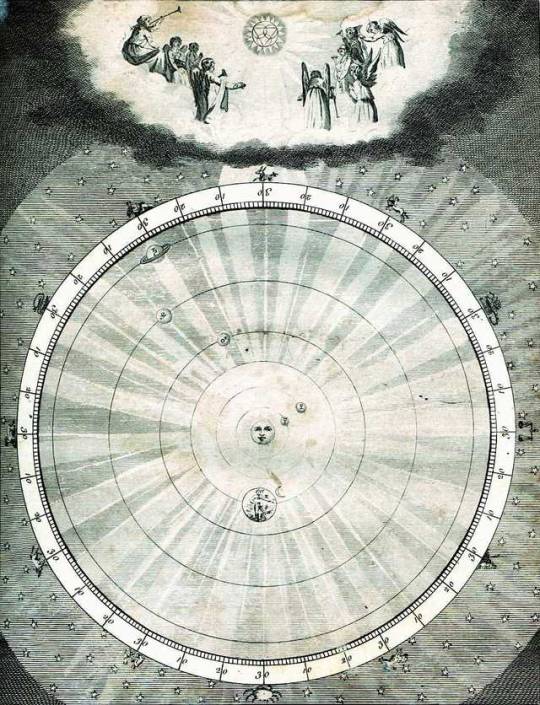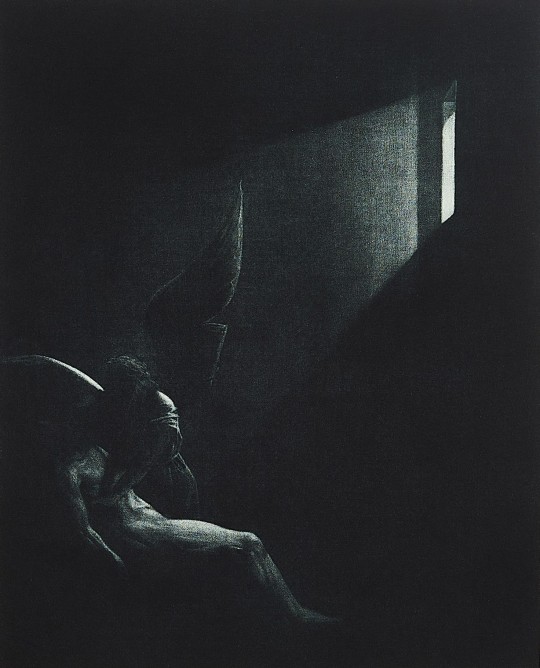“…for love is as strong as death, passion fierce as the grave. its flashes are flashes of fire, a raging flame. many waters cannot quench love, nor can rivers wash it away.”
Don't wanna be here? Send us removal request.
Text
(my mama told me never talk to strangers they only want one thing they want to eat)
in a red coat with sharp ears he had on me many years he gave me flowers he watered with his tears
but he has sharp teeth through which he looks at me and if looks can kill he will never leave me
watch out for the bushes where my favorite food is he is somewhere hidden if i do not see him
i hear his bark from the trees that keep his rings i hear his growl in the wind he is committed
he has sharp teeth through which he looks at me and if looks can kill he will never leave me
i am the center of his world i am his favorite girl...
0 notes
Text

I will teach men the meaning of their existence: the Superman, the lightning out of the dark cloud- man.” ― Friedrich Nietzsche, Thus Spoke Zarathustra
Lightning - Wielder of the Thunderbolt Talon Abraxas
69 notes
·
View notes
Text
"I am free to give myself up to the sacred madness, I am free to taunt mortals with the frank confession that I am stealing the golden vessels of the Egyptians, in order to build of them a temple for my God, far from the territory of Egypt. If you pardon me, I shall rejoice; if you are enraged, I shall bear up. The die is cast, and I am writing the book--whether to be read by my contemporaries or by posterity matters not. Let it await its reader for a hundred years, if God Himself has been ready for His contemplator for six thousand years."
-Johannes Kepler, The Harmonies of the World (1619)
10 notes
·
View notes
Text



Taurus is ruled by Venus. If you trace the movement of Venus from the perspective of Earth it creates a beautiful five petaled flower. This pattern takes eight years to produce and has been referred to as the “Venus Rose” or “Venus Pentagram”.
87 notes
·
View notes
Text
Of whom and of what indeed can I say: “I know that!” This heart within me I can feel, and I judge that it exists. This world I can touch, and I likewise judge that it exists. There ends all my knowledge, and the rest is construction. For if I try to seize this self of which I feel sure, if I try to define and to summarize it, it is nothing but water slipping through my fingers. I can sketch one by one all the aspects it is able to assume, all those likewise that have been attributed to it, this upbringing, this origin, this ardor or these silences, this nobility or this vileness. But aspects cannot be added up. This very heart which is mine will forever remain indefinable to me. Between the certainty I have of my existence and the content I try to give to that assurance, the gap will never be filled. Forever I shall be a stranger to myself. In psychology as in logic, there are truths but no truth. Socrates’ “Know thyself” has as much value as the “Be virtuous” of our confessionals. They reveal a nostalgia at the same time as an ignorance. They are sterile exercises on great subjects. They are legitimate only in precisely so far as they are approximate. And here are trees and I know their gnarled surface, water and I feel its taste. These scents of grass and stars at night, certain evenings when the heart relaxes — how shall I negate this world whose power and strength I feel? Yet all the knowledge on earth will give me nothing to assure me that this world is mine. You describe it to me and you teach me to classify it. You enumerate its laws and in my thirst for knowledge I admit that they are true. You take apart its mechanism and my hope increases. At the final stage you teach me that this wondrous and multicolored universe can be reduced to the atom and that the atom itself can be reduced to the electron. All this is good and I wait for you to continue. But you tell me of an invisible planetary system in which electrons gravitate around a nucleus. You explain this world to me with an image. I realize then that you have been reduced to poetry: I shall never know. Have I the time to become indignant? You have already changed theories. So that science that was to teach me everything ends up in a hypothesis, that lucidity founders in metaphor, that uncertainty is resolved in a work of art. What need had I of so many efforts? The soft lines of these hills and the hand of evening on this troubled heart teach me much more...
Albert Camus, The Myth of Sisyphus
3 notes
·
View notes
Text


The image is not a medium for which we have to find the proper use. It is what it is and it is beyond all our moral considerations. It is by its essence immoral, and the world’s becoming-image is an immoral process. Jean Baudrillard
3 notes
·
View notes
Text
boo. i want the TRUTH!!!
can someone make analytic philosophy a little more continental so i can post quotes of it and have it be sexy
2 notes
·
View notes
Text
no no no you don’t understand. i had not been exposed academically with depth to ancient philosophy (i.e. the pre-socratics) until recently. “all of philosophy is footnotes to plato” and etc. and i still Do Not Seriously Know Kant beyond his system of ethics.
me: philosophy from these old gizzards who serve as the foundations of the discipline? no thanks let’s attempt science
furious because one year ago i was crying over my adoration of deleuze’s prolix and my ineptitude at understanding his concepts and like a jilted lover i trailed the dark path that is stanning straight up positivism…if ONE person told me to read ONE chapter, even an introductory chapter, of systems theory, just ONE chapter, either ludwig von bertalanffy or a wikipedia page skim, this all could have been prevented…
2 notes
·
View notes
Text
re: my last post
thank goodness he does write “Like That”
i hate that chalmers has These Ideas but writes Like That. my guy where is the pathos…the paroxysm…the poetry…linear arguments are swell but bro you are not a positivist and i have had allen ginsberg’s manic prose committed to memory since age 13. if you are so bent on tonal banality then at least stop beginning your sentences with coordinating conjunctions i will die. it’s whatever at this point because this let me finish the book in 2 hrs. shoutout to mcdonalds writers who feed me garbage but nevertheless satiate my hunger so i do not starve to death.
3 notes
·
View notes
Text
i love continental philosophy because every essay is like let’s just begin with something that is completely wrong
#was re-reading georges bataille#could not keep up with the ease i had as an impressionable and poetic college freshman
3 notes
·
View notes
Text

THE GATES OF HELL, by AUGUSTE RODING
The "Divine Comedy" by Dante Alighieri inspired the gates, especially those from "Inferno" (the first part). They were a portrayal of the entrance to hell, according to the poem.
Rodin was asked to create a doorway for what would be the Museum of Decorative Arts in Paris in 1880. The museum didn’t come about, but he worked on the piece for many years after that. The Gates of Hell stands over six meters high and is more than four meters wide.
The sculpture is filled with many different kinds of people, from those who are suffering to characters from ancient stories. Every person has been created with great care , so they show a lot of feelings and look very real.
The structure was intended to be fluid, with forms appearing to arise from the disordered whole. The organization engenders movement and conflict within the work. In order to express the unrefinedness of the subject, Rodin came up with new techniques employing incomplete bodies and coarse surfaces in his sculpture.
"The Gates of Hell" was altered many times by Rodin as the years went by. He continually modified and rearranged figures, trying out different compositions and motifs. Before being turned into separate sculptures, such as "The Thinker" and "The Kiss," which are among his most well-known works, they started out as parts of the composition
Even though “The Gates of Hell” was never cast in bronze during Rodin’s lifetime, it is still considered one of his most famous and influential pieces. The sculpture stands as a testament to Rodin’s skill in creating sculptures and his study of human emotions and pain.
136 notes
·
View notes
Text
[Care ethics] can be traced back to the 1980s work of Carol Gilligan, a psychologist who studied how women approach real-life moral dilemmas. In contrast to findings about men in earlier studies (Kohlberg 1973), Gilligan found women did not appeal to general principles or make categorical assertions about right and wrong. Instead, they focused ‘on the limitations of any particular resolution and describe[d] the conflicts that remain.’ (Gilligan 1982, 22) ...But care ethicists are not just concerned with ‘what women think.’ Instead, they believe their theory can — indeed, should — guide all of us in moral decision-making, regardless of our gender and the particular dilemmas we face. Through reflection on the lived reality of ethical decision-making, care ethicists are led to the following ideas: that responsibilities derive from relationships between particular people, rather than from abstract rules and principles; that decision-making should be sympathy-based rather than duty or principle-based; that personal relationships have a value that is often overlooked by other theories; that at least some responsibilities aim at fulfilling the needs of vulnerable persons (including their need for empowerment), rather than the universal rights of rational agents; and that morality demands not just one-off acts, but also ongoing patterns of actions and attitudes. Most importantly, care ethicists believe morality demands ongoing actions and attitudes of care, in addition to (or even in priority to) those of respect, non-interference, and tit-for-tat reciprocity — which care ethicists see as over-emphasised in other ethical theories. Importantly, though, care ethicists do not claim that other theories get nothing right: care ethics is not a theory of the whole of ethics or morality, but of important parts of it that have been inadequately appreciated by other theories. (Engster 2007, 61–2; Held 2004, 65, 68; Tronto 1993, 126)
Stephanie Collins, “Care Ethics: The Four Key Claims”
4 notes
·
View notes


